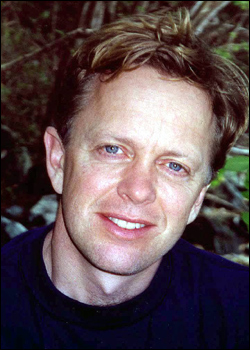Having human feces hurled at you isn’t an experience familiar to most writers, no matter how unpleasant their editors and readers may be. But Ted Conover takes his reporting seriously enough to endure almost any hardship. To write Newjack, the 2000 chronicle of prison guards at Sing Sing that won the National Book Critics Circle Award, he didn’t just take pen and notebook behind bars—he signed up to work as a corrections officer for 10 months at the famous maximum- security prison (where prisoners sometimes fling shit at their jailors for protest and amusement). To research his 1987 Coyotes, about illegal Mexican immigrants, he accompanied his subjects on their perilous journey across the border. For 1984’s Rolling Nowhere, he jumped into boxcars with hobos. Currently, he’s working on a book about the worldwide cultural effects of road building—taking buses across treacherous passes in the Andes and accompanying truckers through malarial swamps in central Africa.
In advance of his April 5 visit to Richard Hugo House, where he’ll give a reading and conduct a workshop on writing nonfiction in the first person, I spoke with Conover by phone and asked him how he’d characterize his work.
“It’s often a sort of hybrid of journalism and anthropology,” he replies. “I get to know [my subjects] through participating in their lives instead of just conducting interviews with them. I add my own experience. These are hard subjects to interest a general reader in. They’re a little gritty and not always pleasant. But I have found that by putting myself in the story, I can interest readers who might not otherwise be interested. And this is a luxury that most daily journalists, faced with constant deadlines, don’t have.”
The paradox is that Conover seems to be finding plenty of opportunity to do this kind of work, even as daily print journalism (to say nothing of TV) is shrinking into smaller and smaller bites. “The idea of narrative long-form journalism is ascendant, it seems, at the same time that regular reporting is more and more abbreviated,” he says. “And maybe those two do go hand in hand.”
OF COURSE, there’s a tricky balance between authorial immersion and impartiality: “Putting yourself in the narrator’s chair . . . entails a number of risks,” Conover says. “I like to think by writing in the first person, I can be more candid about the biases and predispositions that I bring to a subject. At the same time, in a way, maybe I can hope to be more objective.”
This valence between different perspectives and reportorial identities is fundamental to Conover’s work. And it’s far different from the narcissistic “voice” writing that characterizes so many of his lesser contemporaries (including several in this city). His work is about illuminating the subject rather than using the subject to advertise himself. “When you write a first-person piece of reportage or memoir,” he says, “you are choosing from a number of possible I’s, a number of possible selves or personae.” Also, a different I can be thrust upon the writer by his surroundings. Of his Sing Sing experience, he recalls, “People who haven’t been in prison sometimes think that guards are utterly at liberty to define the atmosphere inside an institution like that, when in most ways the institution defines them.” Thus the prison becomes a kind of narrative apparatus acting on the reporter as well as his subject.
And how will the new road-building I be distinct from the prison I? “I don’t exactly know. The me who’s traveling in a truck in Africa is a different person in many ways from the one who was working as a guard at Sing Sing. . . . There will be a different kind of voice. It will be kinetic. It will cover a lot of ground, a lot of space. This will be a kind of travel writing, a travel writing that is attuned to important issues. It’s a book that’s about globalization and what it means when that remote tribe in Peru is contacted by the 21st century for the first time. It will be a very different kind of engagement with the subject.”
The difference may be as basic as that between confinement and freedom, the cell and the open road. Solidarity, more than separation, may turn out to be an important theme. As Conover wrote in National Geographic last year of his travels in Peru, where he confronted his own qualms about road building in pristine areas: “I join a score of other men and push while two trucks . . . strain to pull the one truck from the mud. With a sucking sound, amid clouds of diesel smoke and the roar of engines, it is finally dragged clear. I am filthy now, too, and somehow that clarifies everything: These people, I thought, need a better road.”
Ted Conover will read and conduct a Q&A at Richard Hugo House (1634 11th Ave., 206-322-7030, $3–$5), 7:30 p.m., Mon., April 5; at 10 a.m. that day at the same venue, he’ll lead a workshop (call for price, availability, and other details).








